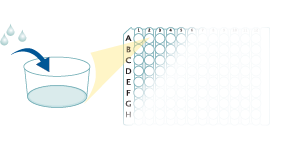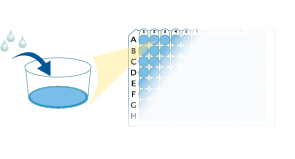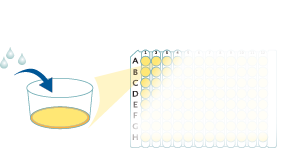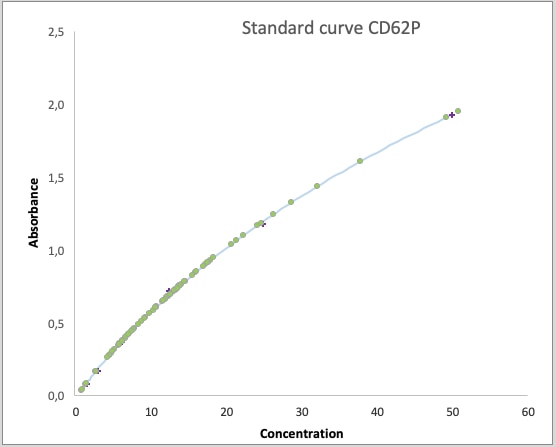Mouse sP-Selectin/CD62P Quantikine ELISA Kit Summary
Product Summary
Precision
Cell Culture Supernates, Serum, EDTA Plasma
| Intra-Assay Precision | Inter-Assay Precision | |||||
|---|---|---|---|---|---|---|
| Sample | 1 | 2 | 3 | 1 | 2 | 3 |
| n | 20 | 20 | 20 | 32 | 36 | 30 |
| Mean (ng/mL) | 1.27 | 2.92 | 12.9 | 1.27 | 2.9 | 12.6 |
| Standard Deviation | 0.1 | 0.23 | 1.13 | 0.08 | 0.24 | 1.13 |
| CV% | 7.9 | 7.9 | 8.8 | 6.3 | 8.3 | 9 |
Recovery
The recovery of mouse sP-Selectin spiked to three levels throughout the range of the assay in various matrices was evaluated.
| Sample Type | Average % Recovery | Range % |
|---|---|---|
| Cell Culture Supernates (n=4) | 100 | 89-110 |
| EDTA Plasma (n=6) | 94 | 80-112 |
| Serum (n=10) | 98 | 81-115 |
Linearity
Scientific Data
Product Datasheets
Preparation and Storage
Background: P-Selectin/CD62P
The Selectin family is comprised of three members, E-Selectin, L-Selectin, and P-Selectin. E-Selectin [endothelial leukocyte adhesion molecule-1 (ELAM-1), CD62E] is transiently expressed on vascular endothelial cells in response to IL-1 beta and TNF-alpha. The human and rat proteins share approximately 67% amino acid sequence identity. The mouse and rat proteins share approximately 78% amino acid sequence identity. L-Selectin (Leukocyte Selectin, LAM-1, LECAM-1, LECCAM-1, TQ1, Leu-8, MEL-14 antigen, DREG, lymph node homing receptor, CD62L) is expressed constitutively on a wide variety of leukocytes. Two forms of L-Selectin have been reported, apparently arising as a result of post-translational modifications. Human and mouse L-Selectin share 76% amino acid sequence identity. Human P-Selectin (GMP-140, LECAM-3, PADGEM, CD62P) is expressed by activated platelets and endothelial cells. The extracellular domains of human and mouse P-Selectin share approximately 73% amino acid sequence identity.
Assay Procedure
Refer to the product- Prepare all reagents, standard dilutions, and samples as directed in the product insert.
- Remove excess microplate strips from the plate frame, return them to the foil pouch containing the desiccant pack, and reseal.
- Add 50 µL of Assay Diluent to each well.
- Add 50 µL of Standard, Control, or sample to each well. Cover with a plate sealer, and incubate at room temperature for 2 hours.
- Aspirate each well and wash, repeating the process 4 times for a total of 5 washes.
- Add 100 µL of Conjugate to each well. Cover with a new plate sealer, and incubate at room temperature for 2 hours.
- Aspirate and wash 5 times.
- Add 100 µL Substrate Solution to each well. Incubate at room temperature for 30 minutes. PROTECT FROM LIGHT.
- Add 100 µL of Stop Solution to each well. Read at 450 nm within 30 minutes. Set wavelength correction to 540 nm or 570 nm.





Citations for Mouse sP-Selectin/CD62P Quantikine ELISA Kit
R&D Systems personnel manually curate a database that contains references using R&D Systems products. The data collected includes not only links to publications in PubMed, but also provides information about sample types, species, and experimental conditions.
22
Citations: Showing 1 - 10
Filter your results:
Filter by:
-
Hutchinson-Gilford progeria syndrome mice display accelerated arterial thrombus formation and increased platelet reactivity
Authors: Puspitasari, YM;Ministrini, S;Han, J;Karch, C;Prisco, F;Liberale, L;Bengs, S;Akhmedov, A;Montecucco, F;Beer, JH;Lüscher, TF;Bongiovanni, D;Camici, GG;
Thrombosis research
Species: Transgenic Mouse
Sample Types: Plasma
-
Pre-Administration of PLX-R18 Cells Protects Mice from Radiation-Induced Hematopoietic Failure and Lethality
Authors: VP Kumar, S Biswas, GP Holmes-Ham, M Sheleg, S Stone, B Legesse, R Ofir, SP Ghosh
Genes, 2022-09-28;13(10):.
Species: Mouse
Sample Types: Serum
-
Octreotide ameliorates hepatic ischemia-reperfusion injury through SNHG12/TAF15-mediated Sirt1 stabilization and YAP1 transcription
Authors: SF Zou, YH Peng, CM Zheng, YX Fei, SW Zhao, HP Sun, JF Yang
Toxicology and Applied Pharmacology, 2022-03-18;442(0):115975.
Species: Mouse
Sample Types: Serum
-
Quercetin Completely Ameliorates Hypoxia-Reoxygenation-Induced Pathophysiology Severity in NY1DD Transgenic Sickle Mice: Intrinsic Mild Steady State Pathophysiology of the Disease in NY1DD Is Also Reversed
Authors: S Thangaswam, CA Branch, K Ambadipudi, SA Acharya
Biomolecules, 2021-10-06;11(10):.
Species: Mouse
Sample Types: Plasma
-
Interleukin-1 receptor inhibition reduces stroke size in a murine model of sickle cell disease
Authors: J Venugopal, J Wang, J Mawri, C Guo, D Eitzman
Haematologica, 2021-09-01;0(0):.
Species: Mouse
Sample Types: Plasma
-
Blocking connexin43 hemichannels protects mice against tumour necrosis factor-induced inflammatory shock
Authors: T Delvaeye, MAJ De Smet, S Verwaerde, E Decrock, A Czekaj, RE Vandenbrou, K Lemeire, A Gonçalves, W Declercq, P Vandenabee, DV Krysko, L Leybaert
Sci Rep, 2019-11-12;9(1):16623.
Species: Mouse
Sample Types: Plasma
-
Sirt3 deficiency does not affect venous thrombosis or NETosis despite mild elevation of intracellular ROS in platelets and neutrophils in mice
Authors: H Hayashi, D Cherpokova, K Martinod, T Witsch, SL Wong, M Gallant, SM Cifuni, LP Guarente, DD Wagner
PLoS ONE, 2017-12-13;12(12):e0188341.
Species: Mouse
Sample Types: Plasma
-
Molecular magnetic resonance imaging discloses endothelial activation after transient ischaemic attack
Authors: Aurélien Quenault
Brain, 2016-11-08;140(0):146-157.
Species: Mouse
Sample Types: Plasma
-
Milano summer particulate matter (PM10) triggers lung inflammation and extra pulmonary adverse events in mice.
Authors: Farina F, Sancini G, Battaglia C, Tinaglia V, Mantecca P, Camatini M, Palestini P
PLoS ONE, 2013-02-25;8(2):e56636.
Species: Mouse
Sample Types: Plasma
-
Early protection from burn-induced acute lung injury by deletion of preprotachykinin-A gene.
Authors: Sio SW, Moochhala S, Lu J
Am. J. Respir. Crit. Care Med., 2009-10-01;181(1):36-46.
Species: Mouse
Sample Types: Tissue Homogenates
-
The effects of NMDA receptor antagonists over intestinal ischemia/reperfusion injury in rats.
Authors: Camara-Lemarroy CR, Guzman-de la Garza FJ, Alarcon-Galvan G, Cordero-Perez P, Fernandez-Garza NE
Eur. J. Pharmacol., 2009-09-13;621(1):78-85.
Species: Rat
Sample Types: Serum
-
Attenuation of transplant arteriosclerosis with clopidogrel is associated with a reduction of infiltrating dendritic cells and macrophages in murine aortic allografts.
Authors: Abele S, Spriewald BM, Ramsperger-Gleixner M, Wollin M, Hiemann NE, Nieswandt B, Weyand M, Ensminger SM
Transplantation, 2009-01-27;87(2):207-16.
Species: Mouse
Sample Types: Serum
-
Biodistribution and safety profile of recombinant adeno-associated virus serotype 6 vectors following intravenous delivery.
Authors: Stone D, Liu Y, Li ZY, Strauss R, Finn EE, Allen JM, Chamberlain JS, Lieber A
J. Virol., 2008-05-14;82(15):7711-5.
Species: Mouse
Sample Types: Serum
-
Vascular dysfunction in a murine model of severe hemolysis.
Authors: Frei AC, Guo Y, Jones DW, Pritchard KA, Fagan KA, Hogg N, Wandersee NJ
Blood, 2008-05-13;112(2):398-405.
Species: Mouse
Sample Types: Plasma
-
High-dose erythropoietin alters platelet reactivity and bleeding time in rodents in contrast to the neuroprotective variant carbamyl-erythropoietin (CEPO).
Authors: Kirkeby A, Torup L, Bochsen L, Kjalke M, Abel K, Theilgaard-Monch K, Johansson PI, Bjorn SE, Gerwien J, Leist M
Thromb. Haemost., 2008-04-01;99(4):720-8.
Species: Mouse
Sample Types: Plasma
-
Reduced plaque formation induced by rosiglitazone in an STZ-diabetes mouse model of atherosclerosis is associated with downregulation of adhesion molecules.
Authors: Tikellis C, Jandeleit-Dahm KA, Sheehy K, Murphy A, Chin-Dusting J, Kling D, Sebokova E, Cooper ME, Mizrahi J, Woollard KJ
Atherosclerosis, 2008-02-21;199(1):55-64.
Species: Mouse
Sample Types: Plasma
-
Rapid conditional targeted ablation of cells expressing human CD59 in transgenic mice by intermedilysin.
Authors: Hu W, Ferris SP, Tweten RK, Wu G, Radaeva S, Gao B, Bronson RT, Halperin JA, Qin X
Nat. Med., 2007-12-23;14(1):98-103.
Species: Mouse
Sample Types: Plasma
-
Elimination of platelet factor 4 (PF4) from platelets reduces atherosclerosis in C57Bl/6 and apoE-/- mice.
Authors: Sachais BS, Turrentine T, Dawicki McKenna JM, Rux AH, Rader D, Kowalska MA
Thromb. Haemost., 2007-11-01;98(5):1108-13.
Species: Mouse
Sample Types: Platelet Poor Plasma
-
Comparison of adenoviruses from species B, C, e, and f after intravenous delivery.
Authors: Stone D, Liu Y, Li ZY, Tuve S, Strauss R, Lieber A
Mol. Ther., 2007-09-25;15(12):2146-53.
Species: Mouse
Sample Types: Serum
-
Endogenous hydrogen sulfide regulates leukocyte trafficking in cecal ligation and puncture-induced sepsis.
Authors: Zhang H, Zhi L, Moochhala SM, Moore PK, Bhatia M
J. Leukoc. Biol., 2007-06-28;82(4):894-905.
Species: Mouse
Sample Types: Tissue Homogenates
-
Cell-based angiopoietin-1 gene therapy for acute lung injury.
Authors: McCarter SD, Mei SH, Lai PF, Zhang QW, Parker CH, Suen RS, Hood RD, Zhao YD, Deng Y, Han RN, Dumont DJ, Stewart DJ
Am. J. Respir. Crit. Care Med., 2007-02-22;175(10):1014-26.
Species: Mouse
Sample Types: Plasma
-
A fibrinogen deficiency accelerates the initiation of LDL cholesterol-driven atherosclerosis via thrombin generation and platelet activation in genetically predisposed mice.
Authors: Iwaki T, Sandoval-Cooper MJ, Brechmann M, Ploplis VA, Castellino FJ
Blood, 2006-01-24;107(10):3883-91.
Species: Mouse
Sample Types: Plasma
FAQs
No product specific FAQs exist for this product, however you may
View all ELISA FAQsReviews for Mouse sP-Selectin/CD62P Quantikine ELISA Kit
Average Rating: 5 (Based on 2 Reviews)
Have you used Mouse sP-Selectin/CD62P Quantikine ELISA Kit?
Submit a review and receive an Amazon gift card.
$25/€18/£15/$25CAN/¥75 Yuan/¥2500 Yen for a review with an image
$10/€7/£6/$10 CAD/¥70 Yuan/¥1110 Yen for a review without an image
Filter by:
We diluted the plasma 1:25





